Satirizing The Media’s Madness: 12 Movies That Did It Right
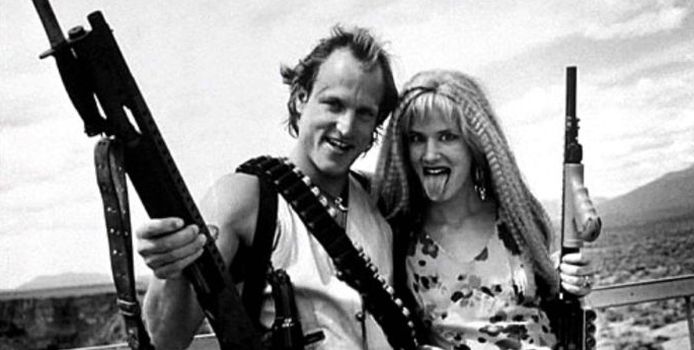
Massive film lover. Whether it's classic, contemporary, foreign, domestic, art,…
Some films parody the media, others predict what effect it will have on us in the future, other movies just have fun with the subject. Whether its a streaming network, printed journalism, television or radio transmissions the media is massive, and inescapable, so why not make movies about this oppressive facet of life?
These films vary in years, themes, genre’s and that’s why they are so important. Ranging from sci-fi, to action and comedy emphasizes the range that the media has over our everyday lives. Some movies explore different media outlets (television, newspaper) while others examine social and political issues, satirizing multiple elements of the media. Some movies, like Wag the Dog, take on politics, show business and public perception, while other movies have a more direct message to convey like Sidney Lumet’s pointed film Network. However the media is satirized in the future as well as the present day while it even takes on new dimensions in other genres such as horror and science fiction.
His Girl Friday (1940)

Howard Hawk’s wasn’t just a director but a foundation layer of our cinematic language, his films range from westerns, war films, adventure tales, but his zany comedies are some of his most well known, and His Girl Friday is one of his best.
Cary Grant plays a fast talking editor whose ex wife (Rosalind Russel) announces she’s engaged to another, less energetic and intentionally boring insurance agent played by Ralph Bellamy. Grant asserts his exciting lifestyle as the superlative choice for his ex wife by dangling a story too juicy to resist while he proceeds send her fiance to jail on trumped-up charges, repeatedly.
Before the internet, television and radio the newspaper was king in the world of our media and newspapermen were known for being quick talking, fast acting, smart witted story spinners. But Cary Grant wields his power to woo his ex wife, imprison her fiance, and manipulate a story to suit his personal agenda.
This might be one of the most entertaining movies ever made. Hawks made films about everything under the sun, but his eye for action, ear for dialogue and incisive sense of social criticism pays off expertly.
Network (1976)
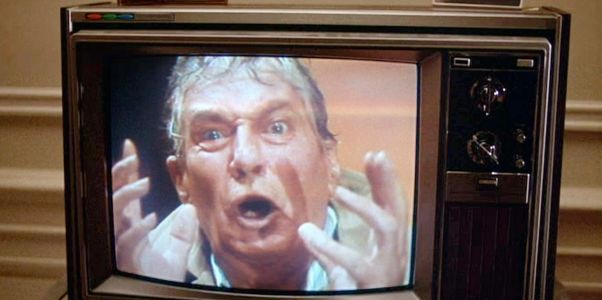
More relevant now than in 1976, Network might be one of the most biting satires of the media, if not all time. Sydney Lumet’s superior direction of Paddy Chayefsky’s assaultive script has aged wonderfully over the years. Since its release, Chayevsky’s script has turned out to be less contentious and more accurate as our media has mutated into what we have today. Reality television revels in people making spectacles of themselves, or true crime programming that wallows in human misery seem to dominate.
Faye Dunaway, William Holden, and Robert Duvall are great but Peter Finch steals the show as the aging suicidal news anchor turned madman prophet. Only to be murdered on air because his ratings slipped. In 1976 that might have seemed like a far out a concept, but would anyone be truly surprised if that happened today?
As the pattern shows over the years films have gotten more and more extreme regarding the violence that’s in the media. Films that theorize what television could turn into such as Series 7: The Contenders, while other movies present violence as a political facet of entertainment a la The Hunger Games. Network might be on the nose, and it might feel like you are being hit on the head, but that’s because that movie has become more relevant over thirty years.
The King of Comedy (1983)

After seeing reality shows and hearing about celebrities being stalked, harassed and attacked the plot to Martin Scorsese’s The King of Comedy doesn’t seem too far out. Robert DeNiro stars as Rupert Pupkin, a hack comedian who believes he’s destined for greatness. His unhealthy fixation with late night TV host Jerry Langford (Jerry Lewis who’s wonderful in a serious role) proceeds into a hair-brained kidnapping scheme in order to become a guest on his show. DeNiro plays Rupert Pupkin as if he was Travis Bickle’s slightly better off older brother in this occasionally disturbing black comedy. Pupkin approaches career advancement the same way Bickle went about righting wrongs in Taxi Driver.
Only in a society with such a scandal-rabid public would a character like Pupkin achieve celebrity status by kidnapping a celebrity, and of course he becomes a celebrity himself by doing so.
Unfortunately for us, there have been multiple kidnapping plots on multiple celebrities not to mention the many assaults and tragic murders that have occurred over the years by crazed fans. The brutal Sharon Tate/LaBianca murders, the stabbing of George Harrison, and the stalking of Steven Spielberg provide some scary insight to Pupkin’s actions. The film is funny because it’s accurate to the truth, but it’s a sad truth. However that’s the world we live in, and that’s evidence that there certainly is a sense of madness in the media.
Videodrome (1983)

Sleazy cable producer Max Renn (James Woods) is on the hunt for the edgiest material he can find; his controversial programming ranges from extreme violence to soft-core porn. But for Renn this programming regime isn’t enough, that is until he stumbles across the pirated signal of a show called “Videodrome“. The partially unscrambled Videodrome sequences turn out to be realistic looking snuff; it’s grotesque but much to Renn’s delight.
The only catch to watching Videodrome is that it gives it’s viewer brain tumors, triggers hallucinations, and in Renn’s case bodily mutations. If this sounds convoluted, that might be because it is, but Videodrome is one of Cronenberg’s most celebrated works and typifies the directors crafted genre of body horror.
Throughout the film human body parts anthropomorphize with televisions, Betamax tapes (VHS were too large to fit in the body cavity prosthetic) and handguns. The director prefigures virtual reality; James Woods grows a vaginal chest cavity, and a television explodes with human innards. In Cronenberg’s world, anything is possible, but the danger in this film lies in what you watch.
Max Renn goes from being a controversial programmer (due to his sleazy content), who becomes a mutating assassin due to his own quest for edgy programming. By the films finale Renn points his mutant hand gun to his head, however after pulling the trigger a television spews only what we can assume are human innards. Is the television an agent for both Renn’s obsession, or a representation of the vile content that we see on (or this case in) television?
Broadcast News (1987)

Brilliantly effective storytelling by the consistently witty director James L. Brooks Broadcast News isn’t as incisive or bombastic as some other films about the media but it is equally, if not more effective. Brooks’ romantic comedy that angles the perils of a romantic ‘menage à trois’ as well as a professional one between stalwart professional producer, Jane Craig (Holly Hunter, great as always), and the two men in her life; her lover (and integral adversary William Hurt) Tom Grunick and her best friend and professional partner Aaron Altman, played by director James L. Brooks.
Broadcast News is brilliant because it touches on themes we can all relate whether or not we are in television or not. It involves themes of romance, and professional ethics and personal responsibility, especially when an anchor is revealed to have faked a teardrop while interviewing a rape victim. What makes Brooks’ film so interesting is that it takes a lighter touch to expose the transparency of television personalities. And most importantly, the transparent level of integrity that media personalities adhere to.
Broadcast News isn’t just a love triangle, nor is the romance a reductive element. The film is a carefully examined study of integrity and professional mores that unfurl with a steady sense of timing.
Natural Born Killers (1994)

Headlines frequently reveal stories of celebrity love affairs, or shocking news about murderers, and serial killers. Now what would happen if there was a high profile romance between a couple who happened to be serial killers endeared by the media? The outcome would probably resemble the media frenzy trailing in the murderous wake of Mickey and Mallory Knox, the homicidal lovers from Oliver Stone’s controversial 1994 film Natural Born Killers.
Never one to shy away from provocative socio/political material, Oliver Stone pulls out all the stops by employing animation, garish visuals, ironic imitation of classic sitcoms, and music video stylistics. The most consequential media send-up is the mock true crime show “American Maniacs”; helmed by the ever entertaining Robert Downer Jr. (whose Gale character has an unquenchable thirst for the criminal mind) serves as an exaggerated if effective reflection of our societies fixation on violence in the media.
Armed with a loaded script by Quentin Tarantino and David Veloz (credited as screenwriters alongside Stone) Natural Born Killers satirizes our medias adornment for glorifying violence, the celebrity status that frequently accompanies serial killers, fan hysteria, and our appetite for excess.
The films lurid decadence might go too far, but what line haven’t we already crossed? We already adorn killers such as Ted Bundy, Jeffrey Dahmer, David Berkowitz, and John Wayne Gacy, with movies, biographies, and books. Natural Born Killers takes that fascination and crams back down our throats.
Wag The Dog (1997)
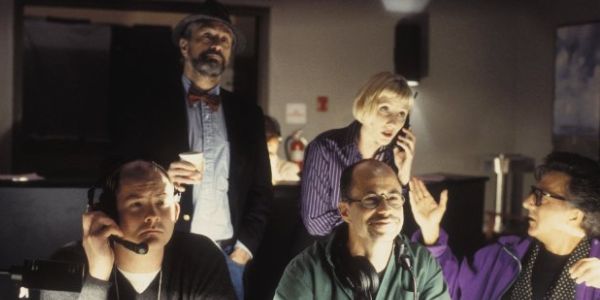
David Mamet, Hilary Hankin, and Chloe King must be psychic when they wrote the script for Wag the Dog. What do you do when the president, who’s up for reelection is caught in a sex scandal? Easy, you start a fake war with Albania. It may sound ridiculous but this movie came out a week before the Bill Clinton/Monica Lewinsky scandal, and one step before the wrongful bombing of an aspirin factory in Sudan.
Barry Levinson directs a notably smart and witty script with a wonderful cast who seems to know all the right moves and when to make them. Robert DeNiro as the quick-witted spin doctor, Anne Heche plays the tightly wound presidential PR head, and Dustin Hoffman steals the show as the hot shot movie producer enlisted to create a convincing manufactured war. Unlike other political and media satires Wag the Dog maintains a light sense of humor without bonking you over the head.
Bulworth (1998)

It feels like Warren Beatty’s 1998 film Bulworth has fallen into the realm of forgotten or overlooked movies as the years passed after its release. Which is a shame because Warren Beatty’s career as a director has yielded some great films and it’s safe to say that this is one of them.
Bulworth might have been misadvertised as the “movie with a rapping senator” but this keenly observed political satire has a level of poignancy and humor that continues to be funny and relevant. Beatty stars as a disillusioned senator who dares to do what every other politician hasn’t, tell the truth. Of course Senator Bulworth becomes the target of the media (as well as a contract killer he placed on himself) by rapping about socialized health care, unemployment and politicians lack of regard concerning racial issues.
As the film proceeds Bulworth adopts hip hop culture and rapping, which serves as a conduit for his new brand of truth spinning. On the surface it’s funny to see Warren Beatty rap, but the content of his freestyling remains moving and pertinent. Just wait until you hear about his “open-ended program of procreative racial deconstruction” plan, I found myself saying simultaneously saying “oh shit” alongside the characters in the film.
As a viewer it’s a pleasure to see a politician speak the truth on screen, but sad that it’s not likely to happen in real life.
Battle Royale (2001)
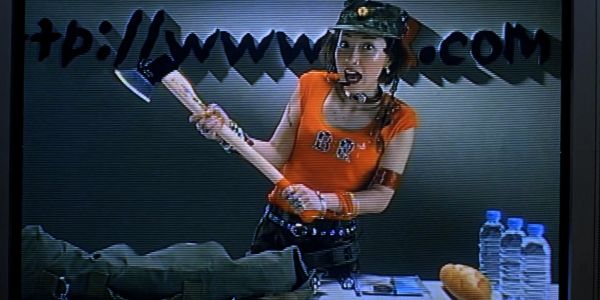
Maverick director Kinji Fukasaku’s last directorial effort is a brilliant adaptation of Koshun Takami’s cult novel Battle Royale, when in the future high school students are selected and forced to fight to the death.
If your primary complaint about the The Hunger Games series is the soft-pedaled PG-13 violence, than Battle Royale is just for you. Fukasaku pulls no stops about portraying the ruthless nature of violence while setting an appropriately witty sense of humor to the film. Battle Royale is fully developed as we see the behavioral patterns appear among the class, some for alliances, others bait people into dying, some turn to suicide but for the most part they try to kill each other.
Sometimes shocking, occasionally funny, and always entertaining Battle Royale is an overtly exciting achievement, and almost too clever for its own good. Making competitive high school social politics into a fight for the death is brilliant satire, and the last survivor is paraded on television and brought into celebrity status.
Series 7: The Contenders (2001)

An obvious yet occasionally brilliant parody of reality television probably had more of an impact at the time of its release (due to the burgeoning regiment of reality shows coming out the time), but Series 7: The Contenders is already developing a cult following. Six people (or “contenders”) are randomly selected, given a gun, and are forced to kill each other in the seventh series of the reality show “The Contenders“.
The contenders range from a middle-aged nurse to an eighteen-year-old high school student, but the most lethal of the bunch is the nine month pregnant Dawn. Being the winner of two previous seasons makes her the fiercest competitor until she realizes one of the randomly selected opponents Jeff is her former lover.
As the film progresses under the “ticking clock scenario” we learn more about the characters as well as the lost romance between Jeff and Dawn. Whittling the black comedy to a love story is a narrative letdown but Series 7: The Contenders is definitely an interesting viewing experience.
The Hunger Games Series (2012-2015)

The story of The Hunger Games is common knowledge at this point, but just in case you’re wondering in the dystopic future young couples from each district are randomly drawn to fight in the titular games in a media covered fight to the death.
Some may argue that the story is just a but too similar to Kinji Fukasaku’s 2000 film Battle Royale, but The Hunger Games series elaborates the media frenzy one step further, in the subsequent films of the series and celebrity status that can be achieved when society turns people into murderous athletes.
The story isn’t restrained to the games themselves but the media parallels that follow the characters in government propaganda, as well as the propaganda used underground resistance as we see in The Hunger Games: Mockingjay – Part One.
While some films on this list examine the present day media frenzy The Hunger Games looks to the future and examines both sides of government oppression and the power of propaganda. We’ve seen people brutalize each other for entertainment for years, since the days of the Roman Empire. What’s to stop the media from regressing from boxing, or fighting to gladiatorial fights to the death?
Nightcrawler (2014)
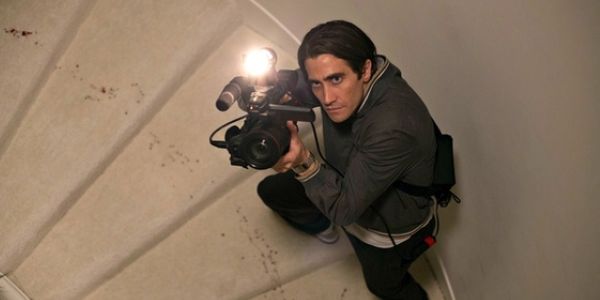
Jake Gyllenhaal brilliantly plays an unhinged young man whose remarkable sense of timing and blind ambition make him a natural born nightcrawler. A unique and direct depiction of our insatiable thirst for human misery; the way that misery is trafficked and the dollar sign that’s attached to images of shootings, car wrecks, and all other types of everyday horrors.
Nightcrawler brings us into the belly of the beast as we witness the wheelings and dealings of Lou Bloom’s (Gyllenhaal’s character) new career, and its realistic tone rings true every step of the way. Bloom’s pursuit of success is as dehumanizing as the material he traffics in. Making Nightcrawler an effectively frightening tale of a demoralizing media. Succinctly directed, and brilliantly acted Nightcrawler turns the audience to look at a world we wouldn’t want to see but feel grateful once we learn the grim indifference that the media has towards human life.
Conclusion
For the most part, these films are works of fiction that reflect the delirium in our media, but some of them have either proven to be right in the case of movies like Network, and Natural Born Killers but some films look to the future where the media is a vehicle for social control and forcing people to commit acts of violence.
What do you think is more relevant, the films from the past like Network, or dystopic movies such as The Hunger Games or Battle Royale? Are movies important when we look at them as reflections of the past, or depictions of the future?
(top image: Natural Born Killers – source: Warner Bros. Pictures)
Does content like this matter to you?
Become a Member and support film journalism. Unlock access to all of Film Inquiry`s great articles. Join a community of like-minded readers who are passionate about cinema - get access to our private members Network, give back to independent filmmakers, and more.
Massive film lover. Whether it's classic, contemporary, foreign, domestic, art, or entertainment; movies of every kind have something to say. And there is something to say about every movie.













